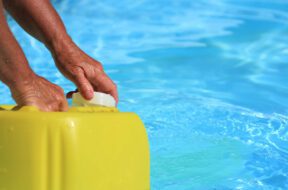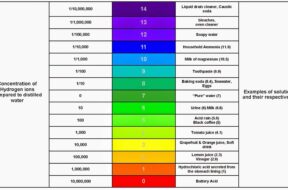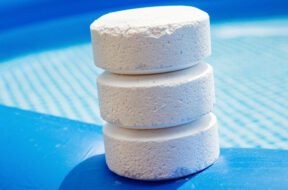
Want to learn more about algaecide? Read on to find out when to add algaecide to your pool maintenance routine and other helpful tips.
The first chlorine pool was invented and used in the year 1911 by Brown University (See source here). Since then, chlorine pools have become the most popular type of pool in the world. But is it time to rethink that norm? Today on Pool Calculator we are going to be comparing chlorine and saltwater pools. This means we’ll be giving a brief overview of each pool, including giving the pros and cons of each pool, and interjecting our personal opinion on whether making the change to saltwater would be right for you.
PC Article on “How to Shock a Swimming Pool“
Most people assume you are talking about chlorine pool when referencing a swimming pool. To most, “swimming pool” and “chlorine pool” are synonymous. Chlorine pools are fresh water pools that are treated with chlorine to clean the water and keep it safe for public use. This safety is paired with the fact that these pools are cheap to install and require less maintenance than saltwater pools. They’re considered “old school” to most people, but if the formula isn’t broke why fix it?
While it is commonly believed that saltwater pools have no chlorine, this is simply not true. Chlorine is produced from the salt that is added to the pool using a salt converter. This salt converter works just hard enough to do the job. This tactics means that the overall chlorine level is lower than chlorine pools and offers just enough chlorine to kill the bacteria in the pool. Being newer to residential areas, saltwater pools offer many pros and cons for consumers to consider:
Chlorine and saltwater pools are highly comparable. This means that the “best option” is not usually clear to see. Chlorine pools are cheaper and simpler in practice, but require more maintenance. Saltwater pools offer lower chlorine levels and less chemical treatment, but are more complex. These pools are easier on the human body, but harder on your pool fixtures. The small differences are easy to see, but there is one huge difference; the cost of installation. Chlorine pools are clearly the budget option. For that reason alone they will likely continue to be the more popular option for consumers.
Try out our Pool Calculator as you clean and maintain your pool! For more information on how to care for your swimming pool, see our blogs on Pool Maintenance
See more on PoolCalculator.com
“How Much Does Pool Maintenance Cost?“

Want to learn more about algaecide? Read on to find out when to add algaecide to your pool maintenance routine and other helpful tips.

In this quick guide, we’ll answer the question “can you over shock a pool” and unveil the factors to consider when shocking a pool.

Maintaining both pH and total alkalinity in your swimming pool is important for keeping your pool properly sanitized and non-corrosive. Total alkalinity is to pH what cyanuric acid is to free chlorine. Total alkalinity stabilizes pH levels. The ideal pool pH level is 7.4 to 7.6. The ideal total alkalinity level is 80 to 120 ppm.

The Association of Pool and Spa Professionals recommends free chlorine levels for both swimming pools and hot tubs be kept between 2.0 and 4.0 ppm. However, the Center for Disease Control recommends free chlorine stay above 1 ppm in pools and 3 ppm in hot tubs.